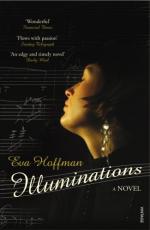|
This section contains 3,401 words (approx. 12 pages at 300 words per page) |

|
SOURCE: Desai, Anita. “Cards of Identity.” New York Review of Books 49, no. 20 (19 December 2002): 70-2.
In the following review, Desai praises Hoffman's prose in The Secret, noting that Hoffman's experience as a nonfiction author contributes to the novel's realistic and “affecting” tone.
Eva Hoffman's previous books have been piercingly specific about time and place—a Polish shtetl, the Holocaust, the New World as experienced by a new immigrant. In her first novel, The Secret, she abandons that grounding in the historical moment and space and goes the whole fictional length into an imagined world set in an imagined future.
The world is still a recognizable one: the book opens in a small college town near Chicago where a mother and daughter live in a “wooden house with two porches, a leafy yard and pleasing, eclectic clutter inside,” even if the narrator plays with “robodolls” and watches “virtual videos” called...
|
This section contains 3,401 words (approx. 12 pages at 300 words per page) |

|


